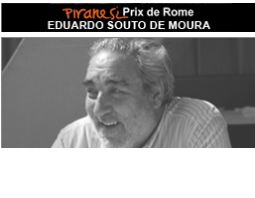 The Awards Committee of the Piranesi Prix de Rome, in collaboration with the Ordine degli Architetti, Paesaggisti, Pianificatori e Conservatori di Roma e Provincia, the Polo Territoriale di Mantova of the Politecnico di Milano and the Pantheon Institute of Rome, have chosen Eduardo Souto de Moura to receive the 2017 Piranesi Prix de Rome Career Achievement Award.
He will receive this prestigious recognition on Friday the 24th of March, 2017, at the Casa dell’Architettura – Acquario Romano in Rome, and then in a lectio magistralis will discuss the high points of a career that began in 1980.
The Awards Committee of the Piranesi Prix de Rome, in collaboration with the Ordine degli Architetti, Paesaggisti, Pianificatori e Conservatori di Roma e Provincia, the Polo Territoriale di Mantova of the Politecnico di Milano and the Pantheon Institute of Rome, have chosen Eduardo Souto de Moura to receive the 2017 Piranesi Prix de Rome Career Achievement Award.
He will receive this prestigious recognition on Friday the 24th of March, 2017, at the Casa dell’Architettura – Acquario Romano in Rome, and then in a lectio magistralis will discuss the high points of a career that began in 1980.
The announcement by Prof. Arch. Romolo Martemucci, President Emeritus of the Accademia Adrianea, Alessandro Ridolfi, President of the Ordine degli Architetti PPC di Roma e Provincia, Luca Basso Peressut, Director of the Premio Piranesi, and Federico Bucci, Pro Rettore of the Polo Territoriale di Mantova of the Politecnico di Milano, is made after careful consideration of candidates from June 2016 onward by members of the Committee including Professor Livio Sacchi (Consiglio Nazionale degli Architetti PPC), Luigi Spinelli and Barbara Bogoni of the Polo Territoriale of Mantova and Pier Federico Caliari, curator of the Piranesi Prix de Rome.
Souto de Moura, born in 1952, and winner of the Pritzker Prize of 2011 (considered the equivalent of the Nobel Prize in Architecture), is one of the best known and most influential architects in the world. He started his studies at the Italian School of Oporto before attended the School of Fine Arts and studied sculpture before graduating in Architecture in 1980. He worked with and was assistant to Alvaro Siza (another Portuguese Pritzker winner) at the Architecture Faculty of the University of Porto.
He is currently Full Professor at the Polo Territoriale di Mantova of the Politecnico di Milano where he teaches Architectural Design in Historical Contexts and Architectural Design. He has also taught Architecture at Geneva, Paris-Belleville, as well as Harvard University, Dublin, ETH Zurich, Lausanne, and the Accademia di Architettura in Mendrisio. Among his most important projects are the Centro Cultural in Oporto (1981-1990), the House in Alcanena (1987-1992); the Cinema House of Manoel de Oliviera in Oporto (1988-2002); Braga Municipal Stadium (2000-2004); the Contemporary Art Center in Braganca (2002-2008); the Casa das Historias Paula Rego in Cascais (2005-2009); the Casa das Artes in Oporto; the transformation of the customs building of Oporto into the Transportation and Communication Museum (1993-2002); the redesigned Convent of Santa Maria do Bouro (1989-1997); the Cultural Center “Espacio Miguel Torga” in Sabrosa (2007-2011); the Paula Regola Museum (2005-2009); and the conversion of the Convent of Bernardas at Tavira (2006-2013).
Souto de Moura has received many awards and honors from prestigious public and private institutions and universities the world over. In addition to the Pritzker Prize, these include the International Prize for Stone in Architecture from Verona, the First Prize in the Biennale Ibero Americana for the Pousada Santa Maria do Bouro project, the Premio Pessoa, and the Heinrich-Tessenow Gold Medal. He is a member of the American Academy of Arts and Sciences, holds the rank of Grand Officier of the Ordem Militar de Sant’Iago da Espada of Oporto, an Honorary Member of Royal Architecture Institute of Canada, an Honorary Member of the Order of Architects of Portugal, and a Member of the Academy of Arts in Berlin for Architecture.
The name and work of this Portuguese master adds an important new chapter in the history of the Piranesi Prix de Rome. He joins an impressive list of previous distinguished recipients – from Rafael Moneo to David Chipperfield, from Peter Eisenman to Bernard Tschumi and Yoshio Taniguchi – who have chosen contemporary architecture as their field of inquiry into the very essence of architecture and permanent classical values within the complex reality of change and becoming.

